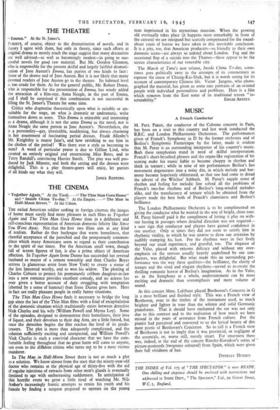THE THEATRE
Emma." At the St. James's.
PURISTS, of course, object to the dramatisation of novels, and in theory I agree with them, but only in theory, since such efforts at original drama as mostly reach the stage suggest that many dramatists are well advised—as well as becomingly modest—in going to suc- cessful novels for good raw material. But Mr. Gordon Glennon, who is responsible for the present skilful and largely faithful dramati- sation of Jane Austen's Emma, has purists of two kinds to face : those of the drama and of Jane Austen.Eut it is not likely that many devoted readers of Jane Austen go to the theatre. Its habitual level is too crude for them. As for the general public, Mr. Robert Donat, who is responsible for the presentation of Emma, has wisely added the attraction of a film-star, Anna Neagle, in the part of Emma, and I shall be surprised if this combination is not successful in filling the St. James's Theatre for some time.
Critics who dogmatise theoretically upon what is suitable or un- suitable for the stage, on what is dramatic or undramatic, write themselves down as asses. This Emma is enjoyable and interesting as a drama, although it is not the same Emma as the novel, nor is Anna Neagle the same person as Jane Austen's. Nevertheless, she is a personality—gay, irresistible, maddening, but always charming in her assortment of fascinating period dresses. Frank Allenby's Mr. Knightley is nearer Jane's, and how ravishing to see him in the clothes of the period! Was there ever a style so becoming to men? A word of particular praise is due to Gillian Lind, who created an entirely original and entertaining Miss Bates, and to Terry Randall's convincing Harriet Smith. The play was well pro- duced by Jack Minster, and both the setting and the dresses were delightful. This is a play theatre-goers will enjoy, let purists of all kinds say what they will.
JAMES REDFERN.


























 Previous page
Previous page